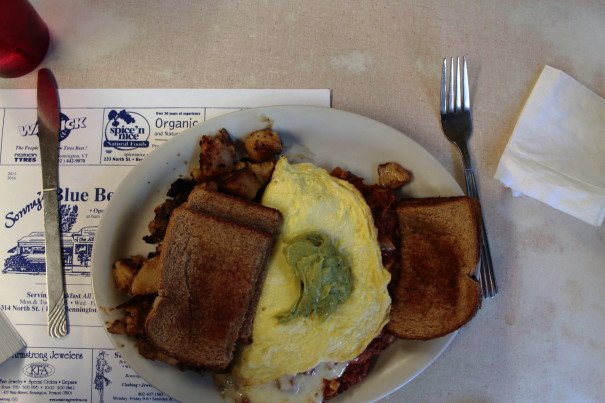
Robert Frost’s Poetry Is Like an Omelet Stuffed With Chili

Robert Frost’s Poetry Is Like an Omelet Stuffed With Chili
Diner Food in Vermont
Who is more American than Robert Frost? Surely he is the last American poet who could be described, to roughly quote Harold Bloom, as both great and popular; who was so able to translate the epic and the ironic into terms so commonplace, into trees and winds and stone walls. We have come to assume he was merely the poet of the American scenery, as opposed to the American soul.
And is there more American a restaurant than the diner? More democratic than the supposition that a ladle of chili between a pancake-fold of egg covered by fried potatoes, served on linoleum countertops with water in red Coca-Cola cups, is, indeed, the highest culinary art?
Both are to be found in Bennington, on the spine of the Green Mountains in the southwest corner of Vermont, where Frost lived with his family and summered after several predeceased him, and where they all are buried under three long, ground-level tombstones, his epitaph announcing the poet’s “lovers quarrel with the world.” Many of his most famous poems, including the Pulitzer Prize-winning “New Hampshire” (last line: “At present I live in Vermont”) and “Stopping By Woods on a Snowy Evening,” were written here, confounding even now with their humor, their vernacular, their deft grasp of place and time and all the worlds of shadow surrounding.
There is also, thank God, the Blue Benn, a railcar diner where dirty plates take their time reaching the kitchen and the waitress flips the Closed sign early so she can start settling accounts. A feast costs less than minimum wage. There are a thousand egg dishes on the menu and a thousand more laminated up above the counter, illustrating the endless variety of food that can be shoved inside of eggs and still taste as if they were the dish for which people domesticated chickens in the first place.
A great chef is a lot like a great poet, in that the former’s mastery of food should be as natural and as obvious as the latter’s confidence with language. When eating or reading there shouldn’t appear to be any other way of doing it, each perfect in its own place. Both also naturally run the risk of over-complication. Some want us to see the exclusivity of what they have accomplished, end results be damned.
So it is not as if Frost avoided cleverness, or that the bare-armed chef comes upon his recipes by accident. Rather, both have sublimated what they do into a single moment as perfect as a falling leaf or a shaft of light. You read, and you eat, and you never think for a second that it should be any way other.
Tell me: is there a more American genius than that?